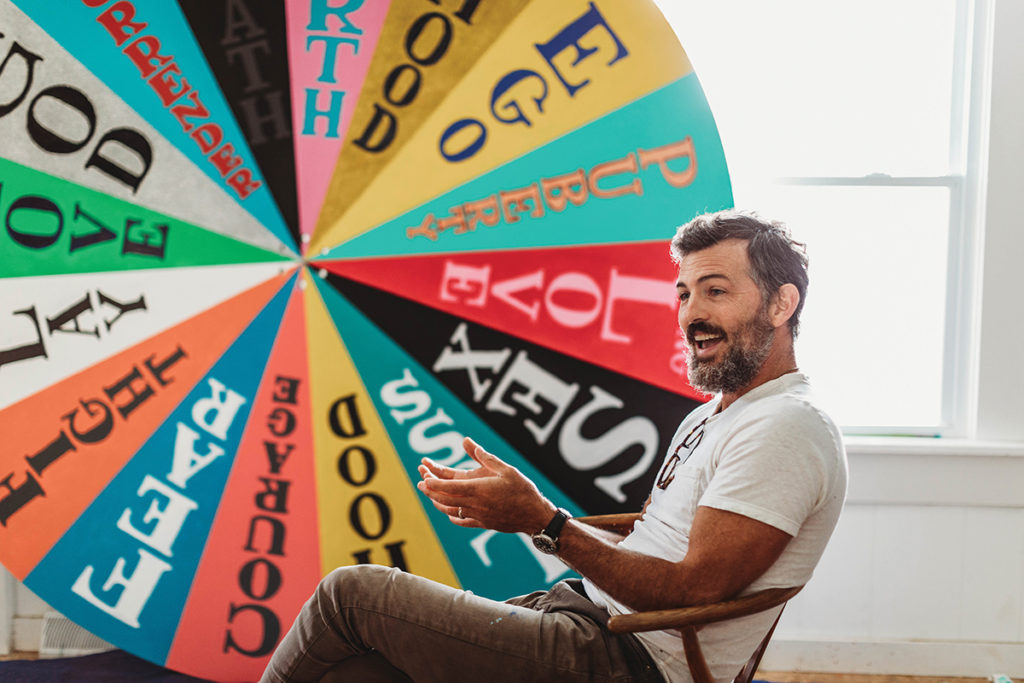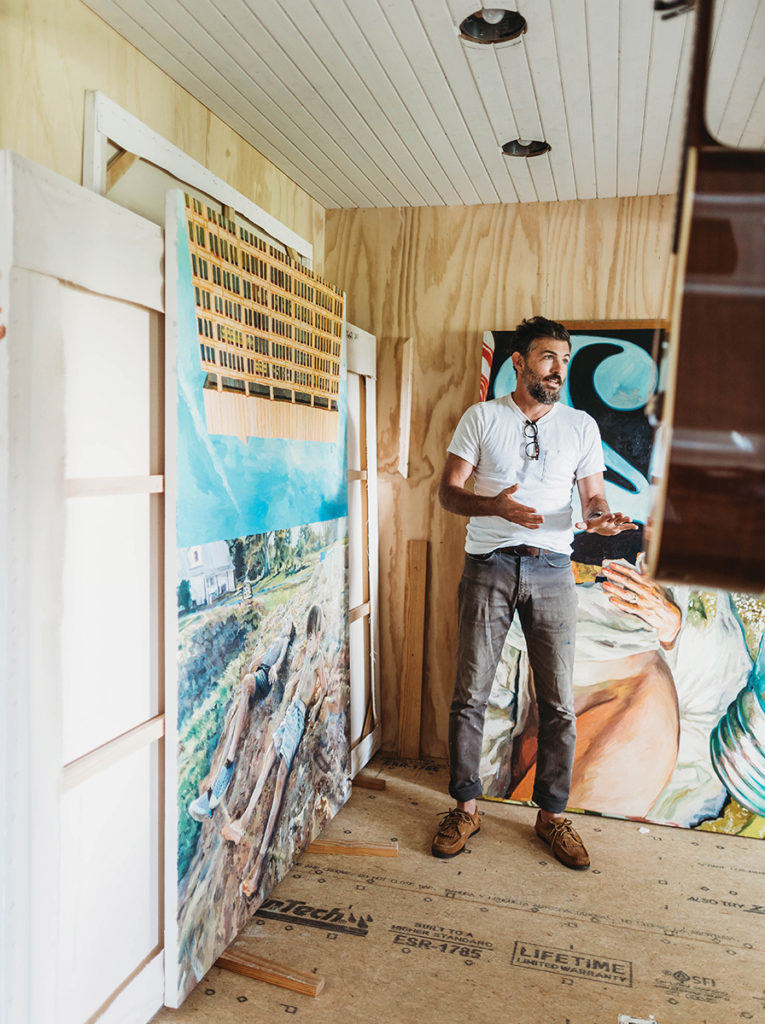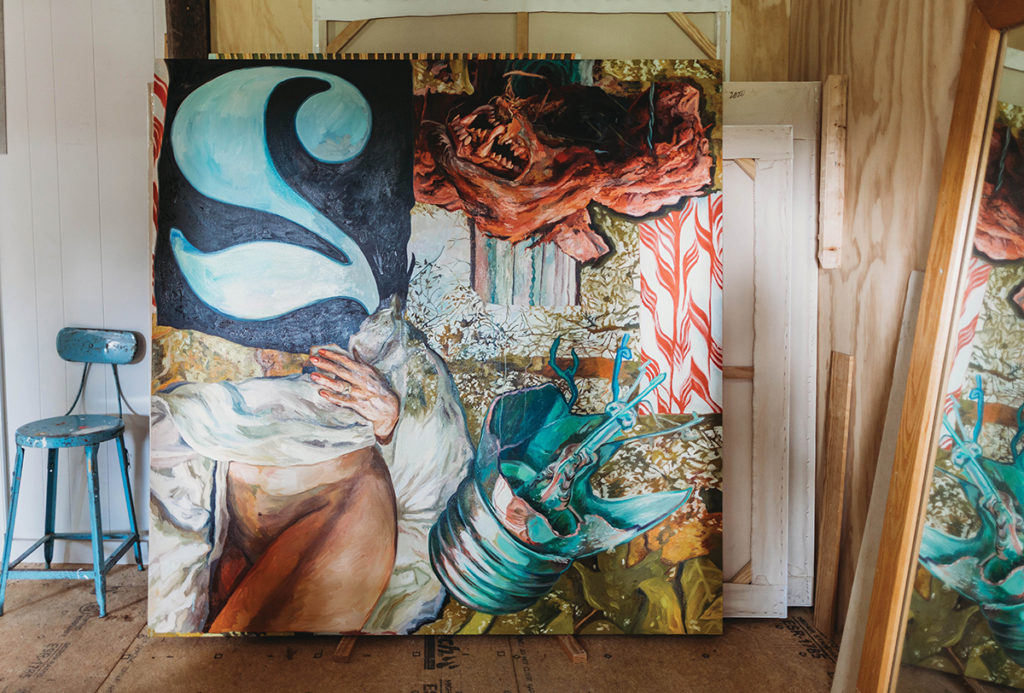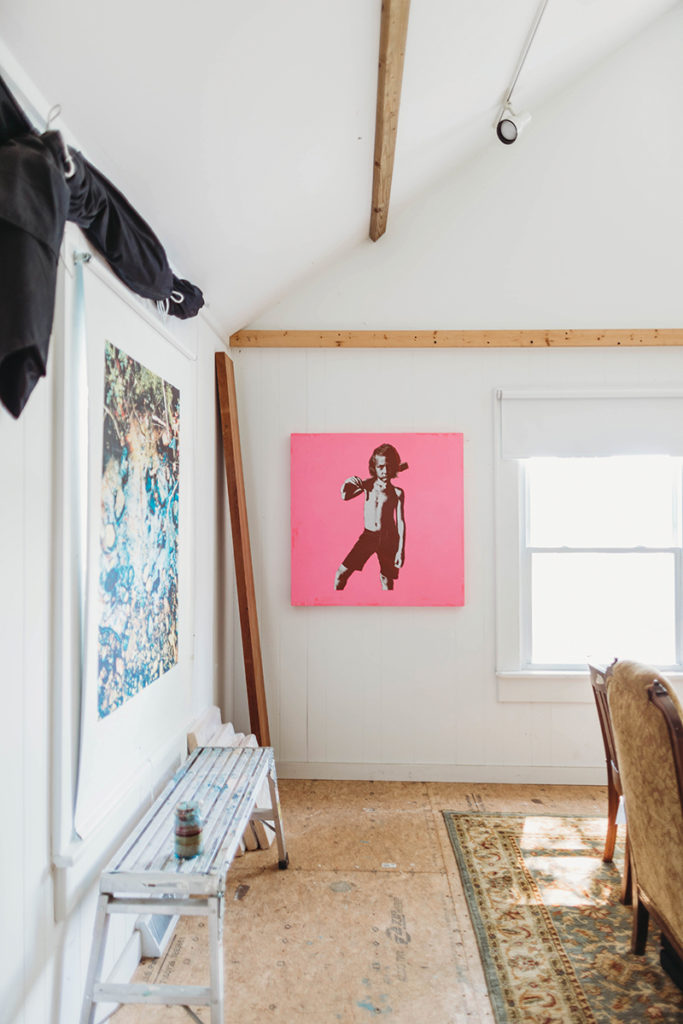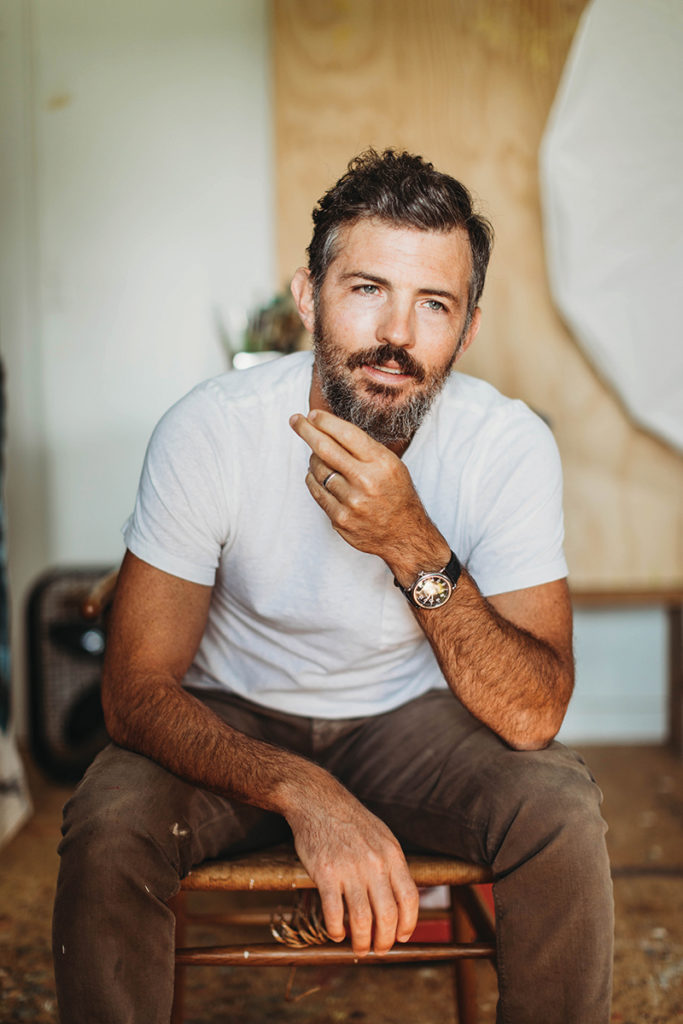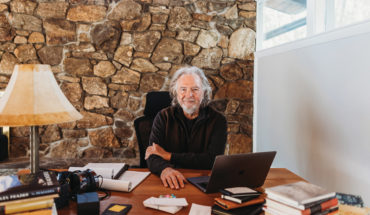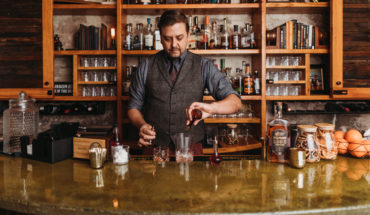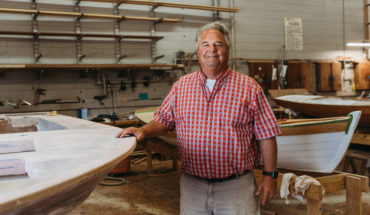Best-known as a frontman for the Avett Brothers, the musician and painter finds inspiration in the North Carolina town where he was raised.
by Wiley Cash | photography by Mallory Cash
When my wife, Mallory, and I arrived to interview Scott Avett one day in early August, he was standing in the driveway of the small house he’d converted into an art studio about 15 minutes outside of downtown Concord.
Most North Carolinians, as well as music lovers around the world, know Avett as half of the Avett Brothers (with his younger sibling Seth), who have sold millions of records and whose career has carried the band from small stages in college towns to the Grand Ole Opry in Nashville and New York City’s Madison Square Garden.
But Avett knows himself as a man whose purpose is to create, and painting is as much a part of his creative life as songwriting. While his visual art has rarely been exhibited publicly aside from a 2019 show at the North Carolina Museum of Art, Avett has been a working artist since graduating from East Carolina University in 2000 with a Bachelor of Fine Arts in studio art.
His paintings and drawings most often speak to family life and the natural world in rural North Carolina, but his work is in conversation with the many cultural and artistic influences he encounters on the road and in his reading life.
In our time together, Avett rattled off quotes from French Impressionist Edgar Degas and the Trappist monk and mystic poet Thomas Merton the way some of us might casually discuss Monday Night Football or the day’s headlines.
It’s clear to me that while his work portrays his daily life on the land in Concord, there is a deeper spiritual mystery residing in the work that speaks to the same unseen hand that guides emotions and ideas like love, duty and purpose.
This mystery, what Avett refers to as “the revelation of meaning beyond the physical act of making,” informs his exhibition After the Fact, running through October at the Greenville Museum of Art. This exhibit will run concurrently with Purpose at Random, Avett’s show at the SOCO Gallery in Charlotte, which began in September and will run through Nov 2.
Purpose at Random features new oil paintings that Avett began working on in the early months of 2020, when he would have otherwise been on the road with the band. In a press release for the show, Avett says, “Painting is a solitary activity. The more time alone the better, I think. The pandemic provided space.”
On the day we meet him, Avett is on a two-week break from touring, so he’s completing a painting that will be featured in one of the upcoming shows. Inside, his studio reveals itself to be a place in creative flux. Paintings either hang on the walls or lean against them, some in various stages of completion.
Hiding among them — and he will show it to us just before we leave in a few hours — is an early draft of a painting of singer/songwriter Brandi Carlile, the final draft of which appeared on the cover of her 2018 multi-Grammy Award-winning album By the Way, I Forgive You.
We follow Avett past a low counter full of his kids’ works-in-progress. The studio is bright and airy. Morning light pours through the windows on the east side of the house.
I tell Avett that I grew up in Gastonia, which is on the west side of Charlotte; Concord sits on its east. We talk about what it was like to be raised so close to Charlotte in the 1980s and ’90s without much awareness of what went on in what seemed to us to be “the big city.”
We joked that the only time we went into Charlotte was to go Christmas shopping at SouthPark. “That was the fancy mall,” Avett says, smiling.
I tell him that once, when I was young, I spotted NASCAR legend Jeff Gordon at SouthPark; that leads us to a conversation about race car drivers. Sunday races served as the backdrop of our North Carolina childhoods, especially for Avett given that Charlotte Motor Speedway sits just a few miles away from the place where he was raised.
I learn that his parents still live there, just a few miles down the road, and his own family’s home is tucked into the woods behind his studio.
Avett’s father was born in North Carolina and grew up the son of a Methodist minister whose calling took the family around the state. Avett’s mother was an Army kid born on a base in Germany before being raised in Kansas and Virginia.
Just before Avett was born, his parents and older sister moved to Alaska where his father hoped to get work as a pipeline welder. But the job fell through, and on the way back south the family lived in Cheyenne, Wyoming, for about a year.
That’s where Avett was born. They eventually found their way back to North Carolina — his father traveled as a welder and his mother taught school — and were gifted 2 acres and an old house outside Concord by an elderly couple who’d long admired Avett’s grandfather.
His father renovated the home, and Avett’s parents lived there until the house burned down last year. But fire can’t burn roots, and Avett’s parents rebuilt.
When Avett and his two siblings were growing up, his parents made certain that education was available to them, especially if the kids were hungry for it. “They were intent on that,” he says. “They said, We will see to it that you have an opportunity to go to school. If we’re broke, we’ll rob a bank to pay for it.” All three children went to college.
Avett values his children’s education as well, especially in the arts. Aside from the makeshift studio set up for them alongside his own work, his daughter is regularly tutored in creative writing by the owner of the local bookstore, Goldberry Books. It’s easy to imagine a holistic education in art and outdoor experiences unfolding for children in a landscape like this.
Our conversation turns toward what could be considered the more practical matters of being a creator, namely what happens when your hobby — whether it’s painting or songwriting or writing novels — becomes your job. Is the mystery of creation compromised?
“As soon as you’re doing something to pay bills, I don’t know that you’re really following your heart,” Avett says. “We’re called to have a purpose, but you can slip off that purpose really quickly, and all of a sudden the purpose becomes to pay the bills more easily. I want to avoid that. There’s a mystery in creating. I want to follow the mystery and get as close to it as I can. But if I’m caught up in success, it just distracts from it.”
Jeff Gordon and NASCAR are still lingering at the corners of my mind, and I mention that Gordon retired from driving at the age of 44. Both Avett and I are now in our mid 40s. I tell him that I doubt Gordon’s physical skills were diminished at that age, but perhaps his awareness of the risks he was taking became more apparent the older and wiser he got. I ask Avett if he’s more aware of the choices he’s making at this stage of his career and if his skills are continuing to sharpen.
“I feel like I’m in the sweet spot, ability-wise,” he says about both performing music and painting. “Physically, I can do it, and mentally my tools have accumulated quite a bit. I see evidence of that when I can make plans about what project I am going to execute. Ten years ago, I might have said, I hope I can do this. I hope I don’t flub it and get stuck.”
He pauses for a moment. “I think I hold it all a little looser than I ever did, and I’m not going to be blown away by whether it hits or doesn’t hit. I don’t know why, but there’s now a barometer, and sometimes it says, Hey, enough, you have enough. Now, can you lean into your purpose?’”
I wonder how it feels to let go of a painting after someone buys it. After all, when he writes a song he can always perform it whether or not it’s on a record or in front of a live audience.
“It rips pretty hard,” Avett says.
“I see painting as me telling my life story, and it’s tough to imagine that some of it’s in Colorado, some of it’s in New York, some of it’s in Texas. But I haven’t gotten too attached to any of them so far. There are only three I won’t let go of. One of my wife and two of our kids that I painted in bathing suits. They’re just portraits of them, but I’ve said those aren’t for sale.”
I ask him if his art is a result of his being anchored to this land. He pauses as if painting an answer in his mind. “We’re all bigger than our place,” Avett finally says. “I am in North Carolina, and I am making the things I’m meant to make. When you can settle that and not think that New York is better than North Carolina, then you can start getting to your work.
“You have to find a corner of the world,” he continues. “I truly believe that on these 80 acres, there is more to explore than I can do in a lifetime. There is so much work to be done, and by work I mean purpose. My purpose is realized here. My purpose is to create. There are a lot of leaves to peel back here.”
Avett pulls out his phone and flips through photos, landing on a picture taken the night before of his 7-year-old son just after he’d fallen asleep. “There’s nothing not timeless about this,” he says. “If my purpose is to recognize relationships and see things, this is a good place to be.” Avett laughs and puts his phone away. “But where’s not?”
This article originally appeared in the October 2022 issue of WALTER magazine.

